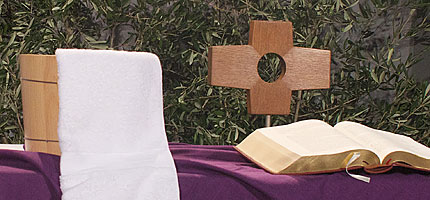© LWB/A. Danielsson
Participants Comment
Question | What do you feel is the significance of the Mennonite action for your church? For the ecumenical movement?
A New Avenue of Ministry
- Bishop Susan Johnson © LWF/Ratna Leak
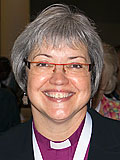
Bishop Susan Johnson, Evangelical Lutheran Church in Canada
For my church: In Canada, we have “Seeds of Hope,” a study and a plan devised to bring Lutheran and Mennonite congregations together to share about their joint histories, this action and its implications. We will continue the bridging between the two communities and find ways to continue the action.
We [Lutherans and Mennonites] have worked together for years ecumenically in advocacy, peace and justice, and relief and development work. And we now hope this will open up a new avenue of mission and ministry.
For the ecumenical movement: Any time there is movement towards healing, towards closeness in the body of Christ, it has a ripple effect in the whole body. So, we hope that this action will help us in Canada work towards unity in the whole body—as a model and as an invitation.
Defined by Tradition
- Asbjørn Hyldgård © LWF/Ratna Leak

Ashbjoen Hyldgaard, Evangelical Lutheran Church in Denmark
For the ecumenical movement | Basically, there is a problem in identifying yourself with what your forefathers have done, especially for us in Denmark, as opposed to our actions today.
On the other hand, partly we are defined by the tradition. Personally, I identify with that past myself. If we have a tradition we cannot identify only with the good part. We have to accept it – good and bad. So, the Mennonite apology makes sense. It’s part of our tradition that we must know about and brings it up to the surface.
Stimulus to Ongoing Dialogue
- Rev. Sumiyuki Watanabe © LWF/Ratna Leak
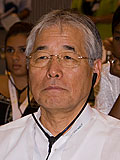
Rev. Sumiyuki Watanabe, President, Japan Evangelical Lutheran Church
For the ecumenical movement | This will provide a stimulus to the ongoing work between Catholics and Lutherans on the Joint Declaration on the Doctrine on Justification. Both sides had thought they were absolutely right, and now we are reaching some settlement.
So, the meaning is that we Lutherans must continue to dialogue with others about matters of absolute truth. We need not say that we are wrong, but find something 50-50.
In World War II, only Japan experienced atomic bombing. The result of being bombed like that can create a feeling of absolute victimhood and righteousness in how people feel towards those who did it. But the Japanese must not hang onto that, but rather must work practically for peace. That has been Japan’s task for the last 60 years.
“Match Point”
- Martin Igancio Diaz © LWF/Ratna Leak

Martin Igancio Diaz, Salvadoran Lutheran Church
For the ecumenical movement | This is a “match point” for ecumenical work with other Christians. It is a door for new beginnings for ecumenism in our regions. Both individual churches and also churches at the “macro” level need to go the same way as the LWF, because that is the real communion of Lutheran churches. I think it is a big step for our community.
We also need to work with other religions. For example, at home we have good partnerships with Islamic people. This is very important in the experience of the church.
Reconciliation Is What the Church Stands For
- Margaret Hansen © LWF/Ratna Leak

Margaret Hansen, Evangelical Lutheran Church in the Republic of Namibia
For my church | It means a lot because it is about reconciliation, and that is what our church stands for. We have worked for reconciliation and peace in Namibia before and after independence. We are an ecumenical church, and our bishop is the president of the Council of Churches of Namibia.
For the ecumenical movement | Reconciliation is what the church is all about, and therefore this reconciliation will encourage all the churches of the Lutheran communion and other churches to reconcile and move together, to move anew.
The Church as a Whole Must Confess
Ulrike Link-Wieczonk, Evangelical Lutheran Church in Oldenburg
For my church | For me personally, it was very impressive that the liturgies show that the reformers had made theological mistakes, that it was not only historical. The reformers must be criticized for these mistakes.
In the Lutheran Church, you often have the impression that Luther is almost holy—almost as if he is part of everything: eating, drinking,and even sleeping. Also, I found it important that this is a confession of guilt of the church itself, not just individuals. I am impressed by the spiritual structure of the worship and services.
Already I have heard from pastors and bishops here who are thinking about their own areas and how they want to hold such a service back home. It is important to develop more insight about this in individual churches.
For the ecumenical movement | This is useful and worthwhile ecumenically, because confessing guilt is important in many areas of the church which have been fettered by such events–church memories can be even longer than historical memories.
A similar situation happened in Constantinople in the fourth century when Crusaders killed other Christians. We still have tensions between among Catholic and Orthodox churches because of this past. That’s why I think it is very helpful to all of us to explore this here in Stuttgart and also to do so in our own contexts.
A Prophetic Voice in This Moment
- Bishop Melvin Jimenez Marin © LWF/Ratna Leak
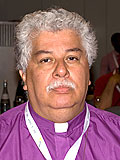
Bishop Melvin Jiménez, Lutheran Costa Rican Church
My church | It is time for a new moment. We have good relationships with Mennonites in the life of our church, but it is very important to give this testimony to other churches and society that Christian churches don’t have problems working together. This is not new for Costa Rica, but is so important.
For the ecumenical movement | This action is an important sign to others that Christians work together and put such things aside for much bigger issues like social justice, poverty and climate change. There is a prophetic voice in this moment.
Practicing the Lutheran Doctrine of Grace
- Bishop Dr Solomon Rajah © LWF/Ratna Leak
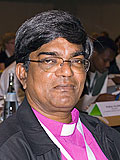
Bishop Dr Solomon Rajah, Evangelical Lutheran Church in Malaysia
For my church | I think it is a very good thing and an important gesture to say that we are sorry. It is never a good thing to persecute another group; instead we must learn to tolerate and understand others and never use violence. It is not good for anyone to use violence with our neighbors.
This is a great step for Lutherans. In the church it is a very old idea that when we feel we have done something wrong or non life-supporting, we need to forgive and be forgiven.
We are practising our Lutheran doctrine of grace. Putting our theology into action is a good example to other Christians that Lutherans know that they have done wrong and are moving forward.
From the Asian perspective the move by our European brothers [and sisters] is very good. In Asia our relationships with Hindus and Muslims also have been difficult, but we have not moved to violence.
Photos
More
- Mennonite Action
- LWI-Special_Mennonites-EN_02.pdf [PDF, 2MB]
- Liturgy-Service_of_Repentance_01.pdf [PDF, 351KB]

